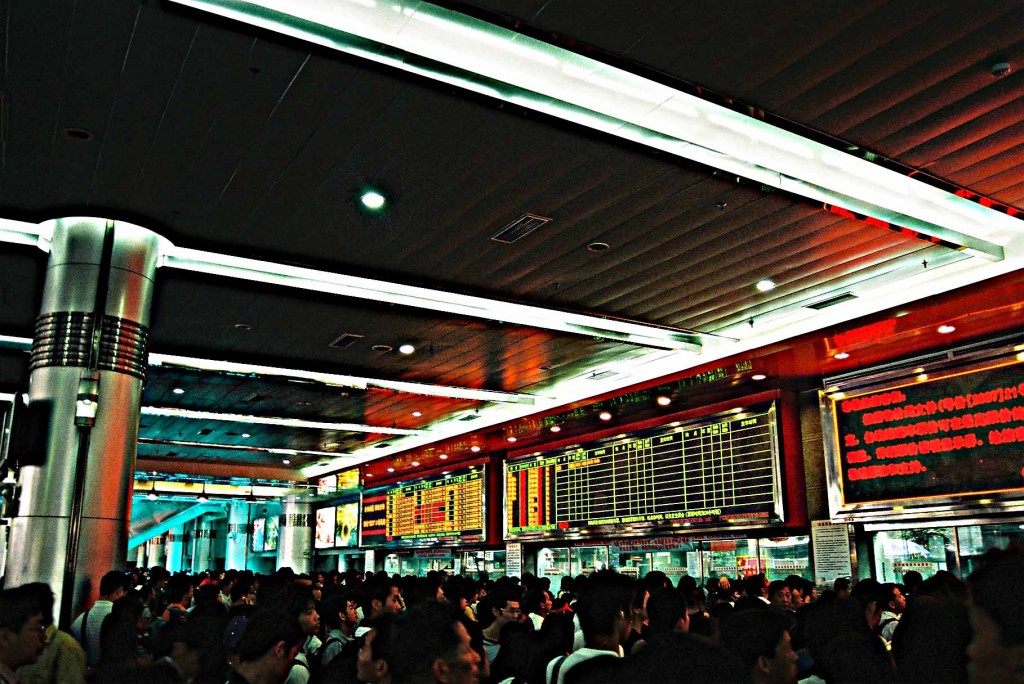As “Chunyun”—the travel season before, during, and after the Chinese New Year—approaches, two of China’s largest rail lines are adopting a “real-name” ticketing system.

Guangzhou Station in Yuexiu District, Guangzhou is a major hub for travel in Southern China. Photo by Don Weinland
Information Times reported Friday that passengers traveling on trains serviced by Guangzhou Railway Group or Chengdu Railway Bureau will be required to produce a valid identification card upon purchasing a ticket. Names and ID numbers will be printed on tickets and must be produced with a corresponding ID card at train stations to gain entrance.
Along with this change in ticketing practice, Information Times reports that passengers will be allowed three tickets per purchase but must produce three separate ID cards: one ticket per ID.
A variety of factors have brought about the introduction of the system. The difficulty of securing a ticket has become a hardship for many Chinese working away from home. “Yellow Cows”, or scalpers, purchase large quantities of tickets in advance to sell at inflated prices. The new measures may also increase safety aboard trains.
Appeals for a new system have been visible since last Chinese New Year’s holiday. An article published January 2009 at Sina.com sought a solution to the problem that has been popularly dubbed “a ticket is hard get.”
春运当前,有关火车票实名制的呼声再次高涨。民意一方呼声急切,以为非实名制而不能解“一票难求”之困局。而处于铁道部一方,则断然表示“成本太高”,言下之意,难于实行。铁道部门的这种“傲慢”,加之其垄断地位、春运种种苦难现象,混合在一起,一再地刺激民意昂扬。
Faced with the New Year’s travel season, appeals for a real-name train ticketing system rise once again. The appeals of the people are urgent, thinking that the “a ticket is hard to get” situation cannot be solved without a real-name system. But [the rail lines] have resolutely expressed that the “expenses are too high,” or in other words, it would be difficult to carry out. The arrogance of the rail department along with their monopoly status, the variety of hardships during the holiday travel season, mix together and once again agitate an upbeat popular opinion.
According to Baidu Encyclopedia, the real-name ticketing system will restore a sense of fairness to rail transportation during a season that is already fraught with difficulty.
目前民众尤其是外出务工人员,在出行乘坐火车这种公益性的大众交通工具时,常常遭遇不公平:虽然长时间排队,却很难买到自己急需的火车票;而一些票贩子却能通过各种手段,获取他们并不急需的火车票。于是,在这种现实面前,公民乘坐火车变成了一种没有权利和尊严的选择:要么你去求人找关系买票;要么你多花钱到票贩子那里买票。
At present when the people, especially those working away from home, take a form of mass transportation such as a train, they often met with unfairness: although they have lined up for a long period of time, it’s still difficult to buy the ticket they urgently need. Yet scalpers have a variety of means of acquiring tickets they don’t need urgently in the least. Faced with these facts, the taking of trains by citizens has become a choice void of rights and dignity. Either you beg someone with good connections to buy you a ticket or you give your money to the scalper.
The Chinese New Year’s travel season, known as “Chunyun” in Chinese, is the world’s largest periodical circulation of people. According to Xinhua News, This year’s travel season will see over 2.1 billion trips made between places of work, hometown, and back again, an increase of 9.5 percent from last year.
Not all agree with the adoption of the real-name ticketing system. Baidu Encyclopedia has listed some common complaints regarding the introduction of the system:
春运期间,铁路与民航的最大区别是客流量大。一旦推行实名制后,将会增加售票的信息录入时间和验票的信息核对时间,降低工作效率,影响人流疏散,加剧人群滞留,容易形成挤压伤人事件隐患。所以,实名制在现实中不具有可操作性。
During the holiday travel season the biggest difference between rail and air transportation is the large volume of train passengers. As soon as the real-name system is in place ticket registration and ticket checking time will be increased, work effectiveness [for rail employees] will be decreased, influencing the dispersing of the flow of people, adding to build up of crowds, and creating the conditions for trampling incidents. Therefore the reality of a real-name system is not workable.
这仅仅是增加了黄牛的麻烦,并不能从根本上解决问题,真正的黄牛,肯定不会是去排队买票的,既然是从内部拿票,所以你买黄牛票的时候只需带上你的个人信息,如此而已。
This only increases the difficulty of the scalper’s business but by no means fundamentally solves the problem. Real scalpers certainly don’t line up to buy tickets. Because they buy tickets [from a connection] within the ticket office, you will only have to provide your personal information when buying a scalped ticket. It’s as simple as that.
The Chinese New Year’s travel season is generally defined as a period of forty days before, during, and after Chinese New Year’s, or Chunjie in Chinese. According to Baidu Encyclopedia, this year’s travel season begins Jan. 30 and ends Mar. 10. Chinese New Year’s, a lunar calendar holiday, lands on Feb. 14 this year and lasts fifteen days.
Information regarding the “real-name” system was first leaked online on Dec. 10 from a Chinese blog. The changes were later confirmed by a railway insider in an Information Times article.






